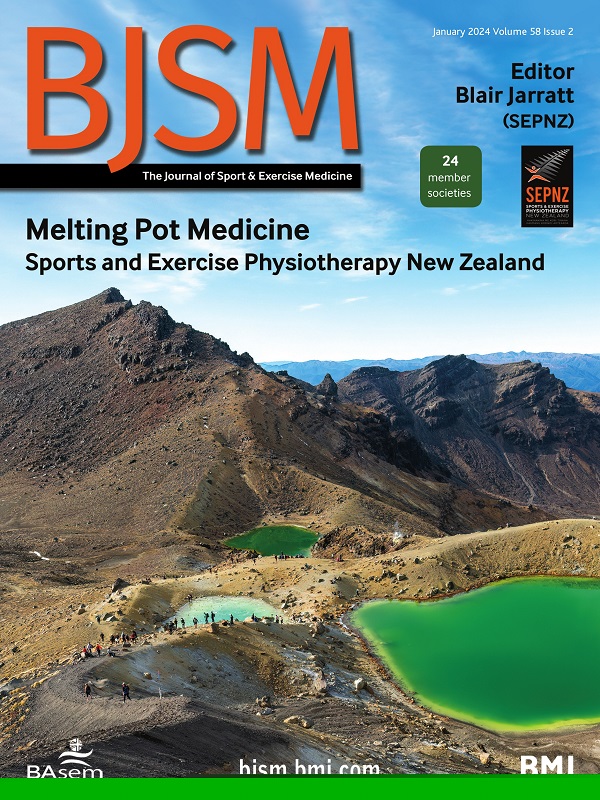量身定制的损伤和疾病预防和管理的有效性,以减少适应性运动中健康问题的患病率和严重程度:一项随机对照试验
IF 11.6
1区 医学
Q1 SPORT SCIENCES
引用次数: 0
摘要
目的:本随机对照试验评估适应性运动损伤预防(Tailored Injury Prevention in adaptive Sports, TIPAS)干预对有身体障碍的适应性运动运动员运动相关健康问题的疗效。方法随机选取60名参加适应性运动的身体障碍运动员作为干预组,47名作为对照组。干预组接受直接的、自动的、预先确定的预防和管理措施,这些措施是根据他们每周报告的健康问题、身体缺陷和运动情况量身定制的。主要终点是40周内的损伤和疾病发生率。次要结局是发病率、每周累积严重程度评分、每周时间损失和总负担。采用多项混合方法分析,以确定随时间推移的干预效果。结果女53人,男54人;年龄±45岁)在研究期间报告了449个健康问题(162个疾病,287个损伤)。干预组的总体健康问题患病率为44%,对照组为46%。随着时间的推移,没有发现显著的主要干预效果(疾病OR: 1.02;95% CI: 0.52 ~ 1.99;OR: 1.01;95% CI: 0.55 ~ 1.86)。然而,一个显著的正time×group交互效应(p<0.001)表明,随着时间的推移,干预组的伤害患病率降低了,尽管疾病患病率没有降低。比率与严重程度分析显示,干预组的疾病严重程度明显低于对照组。结论:TIPAS干预对运动相关损伤和疾病的总体患病率无显著降低,并可能降低整个荷兰运动季节中运动相关疾病的严重程度。这种量身定制的在线预防战略提供了一种易于使用的方案,可在适合运动员身体缺陷、运动参与和当前健康状况的适应性运动中加以考虑。试验注册号:ICTRP注册号:NL-OMON24078。本文章由计算机程序翻译,如有差异,请以英文原文为准。
Effectiveness of tailored injury and illness prevention and management to reduce the prevalence and severity of health problems in adapted sports: a randomised controlled trial.
OBJECTIVE
This randomised controlled trial evaluated the efficacy of the Tailored Injury Prevention in Adapted Sports (TIPAS) intervention on sports-related health problems in athletes participating in adaptive sports with physical impairments.
METHODS
We randomly assigned 60 athletes participating in adaptive sports with physical impairments to an intervention group and 47 to a control group. The intervention group received direct, automated, predetermined preventive and management measures tailored to their weekly reported health problems, physical impairments and sports. The primary outcome was injury and illness prevalence over 40 weeks. Secondary outcomes were incidence, weekly cumulative severity score, weekly time loss, and total burden. A multinomial mixed methods analysis was performed to identify an intervention effect over time.
RESULTS
The athletes (53 women, 54 men; age±45 years) reported 449 health problems (162 illnesses, 287 injuries) during the study period. The overall prevalence of health problems was 44% in the intervention group and 46% in the control group. Over time, no significant main intervention effect was found (illnesses OR: 1.02; 95% CI: 0.52 to 1.99; and injuries OR: 1.01; 95% CI: 0.55 to 1.86). However, a significant positive time×group interaction effect (p<0.001) indicated a reduction in injury prevalence in the intervention group over time, though not for illnesses. The rates versus severity analysis showed a significantly lower illness severity in the intervention group relative to the control group.
CONCLUSION
The TIPAS intervention provides a non-significant decrease in the overall prevalence of sport-related injuries and illnesses and may reduce the severity of sport-related illnesses throughout a Dutch sports season. This tailored online preventive strategy provides an accessible programme to consider in adapted sports suited to athletes' physical impairments, sports participation and current health status.Trial registration number: ICTRP register: NL-OMON24078.
求助全文
通过发布文献求助,成功后即可免费获取论文全文。
去求助
来源期刊
CiteScore
27.10
自引率
4.90%
发文量
217
审稿时长
3-8 weeks
期刊介绍:
The British Journal of Sports Medicine (BJSM) is a dynamic platform that presents groundbreaking research, thought-provoking reviews, and meaningful discussions on sport and exercise medicine. Our focus encompasses various clinically-relevant aspects such as physiotherapy, physical therapy, and rehabilitation. With an aim to foster innovation, education, and knowledge translation, we strive to bridge the gap between research and practical implementation in the field. Our multi-media approach, including web, print, video, and audio resources, along with our active presence on social media, connects a global community of healthcare professionals dedicated to treating active individuals.

 求助内容:
求助内容: 应助结果提醒方式:
应助结果提醒方式:


